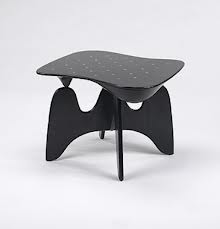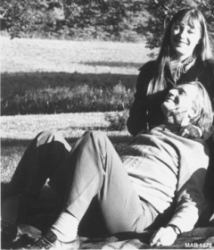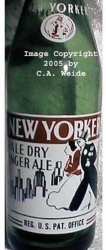
Isamu Noguchi was born in San Francisco in 1904 but moved to Japan as a child. He returned to the USA in his teens and enrolled as a pre-med student at Columbia University, but part-time sculpture classes and exposure to the New York art world caused him to leave college and pursue sculpture full-time. He applied for and received a Guggenheim Fellowship after seeing an exhibition of Constantin Brancusi's work, and by 1927 was working in that artist's Paris studio. Brancusi's reductive forms pushed Noguchi toward a sculptural abstract modernism that expressed itself in his simple, meditative forms. His public career in the United States was launched with a large-scale commission for the AP offices at Rockefeller Center, and he opened a studio in Greenwich Village in 1942. New York continued as his home base during wide-spread international travels and the eventual opening of a studio in Japan. In 1985 he opened the Isamo Noguchi Garden Museum in Long Island City, across the East River from Manhattan and across the street from his current studio. His best-known furniture designs were produced by Herman Miller, whose design director George Nelson invited Noguchi to contribute to the company's 1947 collection. That year's catalogue included work by Charles & Ray Eames, Paul Laszlo, Noguchi and Nelson, and is considered one of the most influential collections in the history of modern design. Noguchi showed his iconic Coffee Table, which consists of two identical curved L-shaped base pieces joined by a pin, and supporting a rounded triangular glass top. It is one of the most recognizable shapes of the 20th Century, and its' simplicity and sculptural essence reshaped the form of contemporary design. His Rocking Stool and related Dining Table (1954), and the Rudder Stool and Tables are today regarded as classics, while the Coffee Table has rarely been out of production, and has added the quality of endurance to its' admirable aspects. Other designs include his bakelite Nurse intercom (Zenith 1937), derived from a Japanese fencing mask, and the Akari line of paper, metal, and wood lamps which are still in production. Celebrated as a world-class sculptor, exhibited and collected by major institutitons on every continent, Noguchi's equal genius in creating new forms of furniture still influences contemporary design.




.png)